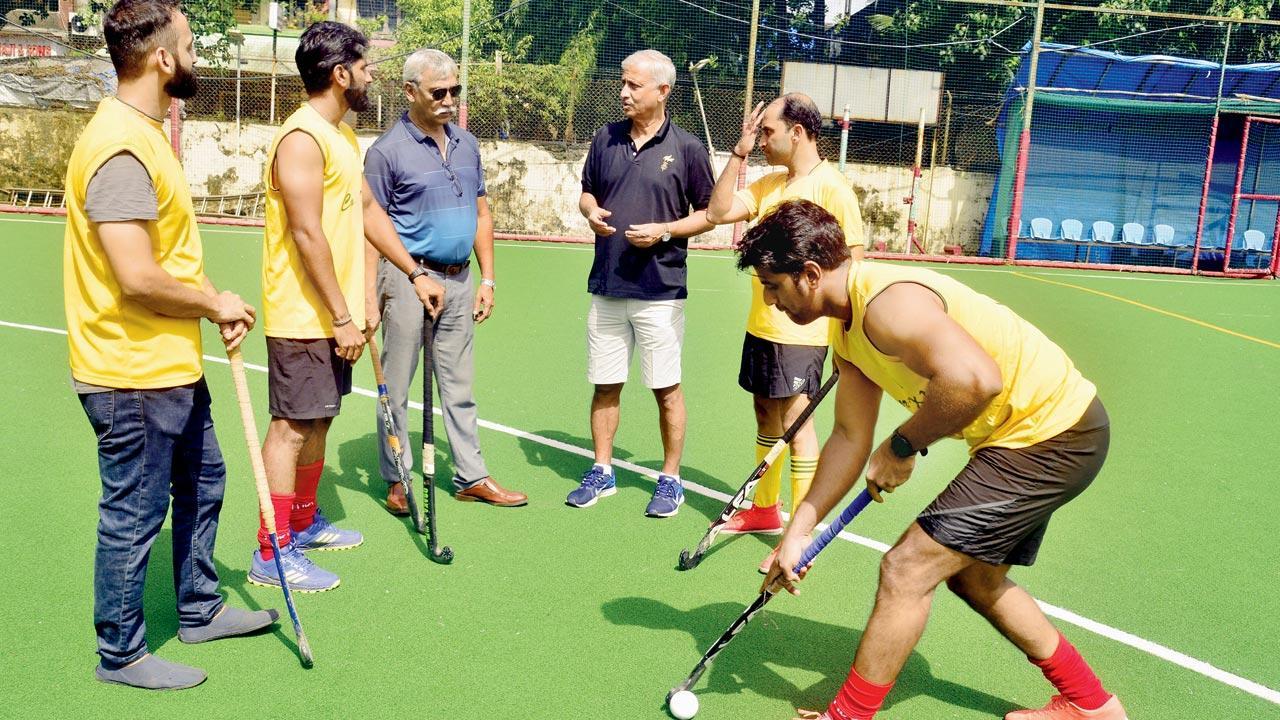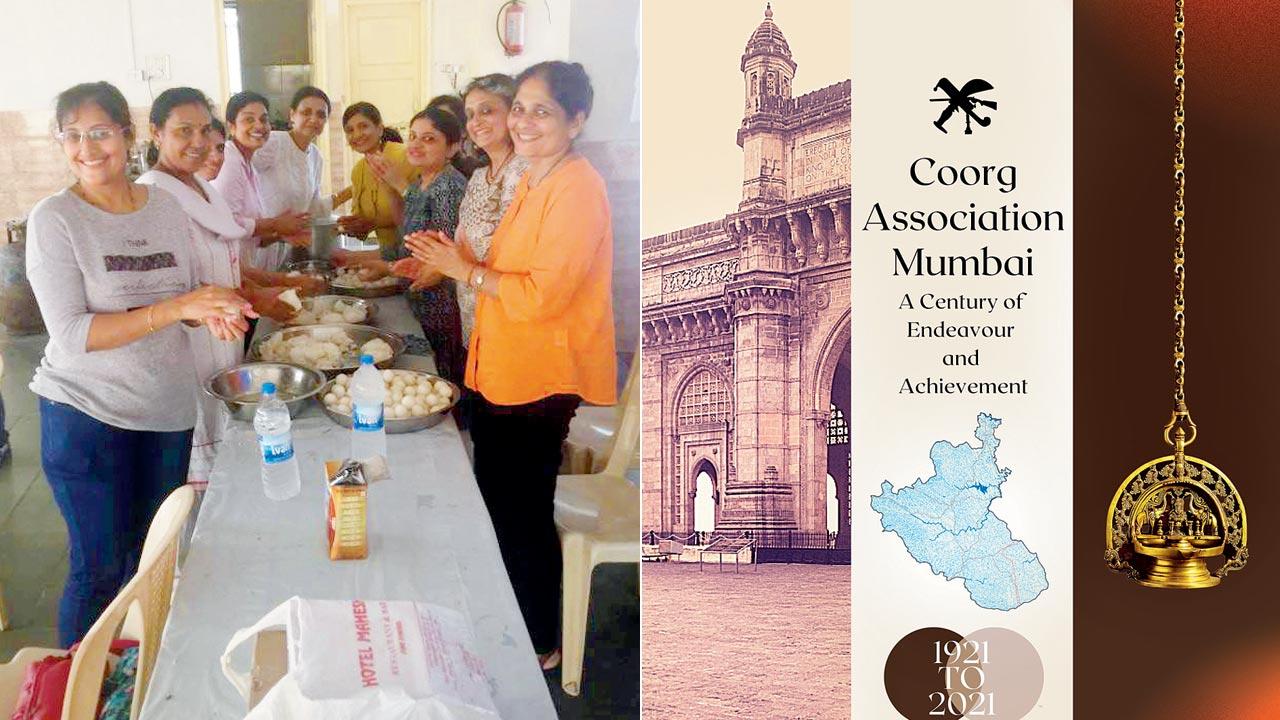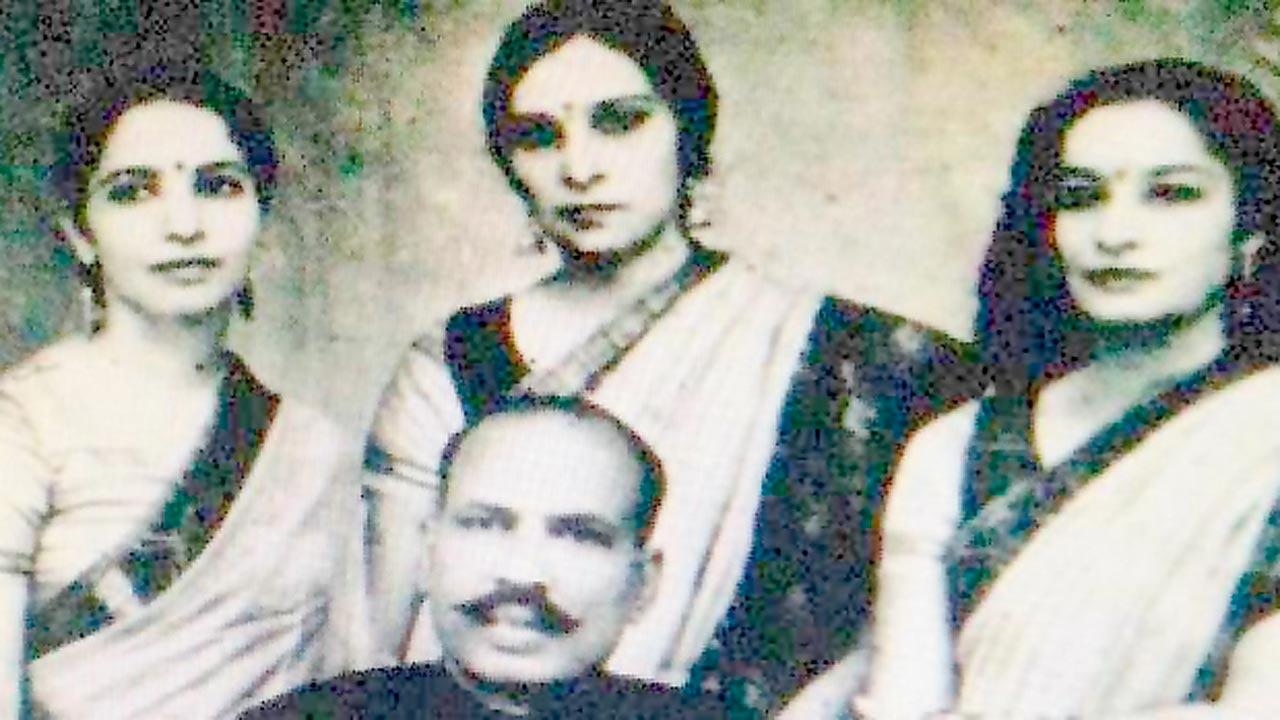An organisation founded by the people of Karnataka’s Kodagu district has persevered for 100 years in the city by supporting the Coorgi community and celebrating its culture, while forging deep ties with Mumbai

Team members Rohan Nanjappa, BK Muthana, Nitin Chengappa and BK Appachu with manager Jagdeep Nanjappa and Coorg Association Mumbai president and former India captain MM Somaya at St Stanislaus Sports Complex in Bandra where they have played tournaments in the past. Pics/Shadab Khan
Last week, Mumbai’s Coorgi community celebrated Kailpodh, a festival to signal the end of transplantation of the paddy crop. Agricultural implements and weapons were worshipped. “Our festivals,” says MM Somaya, president of the Coorg Association Mumbai (CAM) and former India hockey captain, “help us get back to our roots.”
Coming up next, say CAM members, is Kaveri Sankramana in mid-October that celebrates the birth of the river in Coorg. November will bring with it the harvest festival, Puttari. On these occasions, the Association’s catering committee meets in the office building in Airoli to prepare traditional delicacies such as pandhi curry (pork curry), kadambuttu (rice dumplings), akki oti (rice roti) and thambuttu (a sweet dish made with bananas). “This has been the tradition since the establishment of the Association,” says Lekha Nanjapa, head of the catering team, “Initially, people carried food from their homes, but gradually, we started gathering a day before to cook in the community kitchen, spending a fun afternoon over stories and gossip. The kitchen has old brass cauldrons with kalai coating, large enough to cook 20-25 kilos of food at one time.”
 Members of the Association’s catering committee meet at the office in Airoli on the eve of festivals such as Kailpodh to prepare pandhi curry and kadambuttu; (right) CAM celebrated its centenary last year, and the members have just released a book carrying a compilation of stories, anecdotes and accounts to mark the occasion
Members of the Association’s catering committee meet at the office in Airoli on the eve of festivals such as Kailpodh to prepare pandhi curry and kadambuttu; (right) CAM celebrated its centenary last year, and the members have just released a book carrying a compilation of stories, anecdotes and accounts to mark the occasion
CAM celebrated its centenary last year, and the members have just released a book to mark the occasion. Carrying a compilation of stories, anecdotes and accounts written by members, Coorg Association Mumbai: A Century of Endeavour and Achievement, hopes to find its way to Coorgi associations in other parts of the country too.
CAM, says Somaya, was launched as a way for the community to gather and observe customs unique to their culture. Among the efforts that have kept the members close is the setting up of the Association building in Airoli in 1996. Apart from serving as a venue for events and a way to raise money for charity, it also has residential rooms available at nominal rates to youth coming in to Mumbai from Coorg for education and work. “The objective,” Somaya explains, “is to guide the younger generation and give them a chance to get a foothold in the city”.
 Among members of the Kodava community who flourished in Bombay were the Codanda Poovaiah sisters, prominent in Indian dance. Their bungalow at Chowpatty was regularly visited by practitioners
Among members of the Kodava community who flourished in Bombay were the Codanda Poovaiah sisters, prominent in Indian dance. Their bungalow at Chowpatty was regularly visited by practitioners
CAM’s social service initiatives include extending support to the home district at the time of natural disasters, and helping deserving candidates study further. Somaya speaks of two young girls, daughters of displaced families, who are presently studying engineering at the Coorg Institute of Technology, Ponnampet, and whose college fees, boarding and lodging expenses are being borne by CAM.
Nitin Chengappa, a senior bank executive who lived in Chennai, Kolkata, and Delhi before moving to Mumbai 18 years ago, says that the bond between its members sets the Mumbai Association apart. “I have been part of the Coorg Association in every city I have lived in, but the ties here are very strong,” he notes. “It comes from the fact that generations have lived in Mumbai, so there is a sense of ownership. The core team are family members of those who have been involved since the foundation of the Association.”
Community members have also, MM Somaya points out, merged well with the city pursuing careers in administration, the armed forces, business and sport, which has only served to further strengthen the ties. “Our people have contributed to the society here,” he states, listing individuals like Kodandera C Madappa, who held the post of Director General (Shipping) in Mumbai; Bollera C Cariappa, who used to be CIDCO Chairman and later served as head of Bombay Municipal Corporation; Kuppanda M Chinappa, the Managing Director of TATA Electric, and the Codanda Poovaiah sisters who were prominent names in Indian dance.
But the activity that has glued this small community and CAM’s members together is undoubtedly their love for sport, especially hockey. The Coorg XI Hockey team, founded by Kandarthanda Kuttappa, was registered with the Bombay Provincial Hockey Association in the 1930s and still plays in the Mumbai Hockey League. “We have endeavoured to use sport as a unifier,” admits Somaya, the Association encouraging its growth by picking up budding players from Coorg and bringing them to Mumbai to get exposure, while also supporting other games such as cricket and bridge. After a 25-year gap, when no team was playing in the league, Biddanda Jagdeep Nanjapa took over its running in 2001. Since then the team has played at prestigious national-level tournaments such as the Bombay Gold Cup.
For Nanjapa, who was born and brought up in Mumbai, the attachment to CAM has been generational. It started with his father, who migrated to the city in the 1940s and continues with his sons, who are now active members. This separates him from the floating Coorgi population that comes to Mumbai to work. The generational association has also meant that the family has borne witness to the institution’s evolution. “Things were tough initially—recession in the 1930s brought in Kodavas who found living in Coorg difficult and ventured to different parts of the country. We used to book outside halls, take small donations and were just about meeting expenses. Today, our people are doing better. The Association is also able to generate income by renting out the hall at the office building [for functions]. We are faring well as a community and as an Association.”
 Subscribe today by clicking the link and stay updated with the latest news!" Click here!
Subscribe today by clicking the link and stay updated with the latest news!" Click here!










